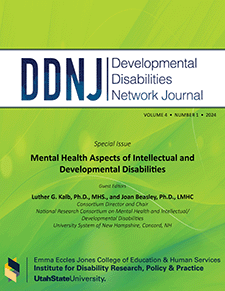The Developmental Disabilities Network Journal is an open-source academic journal focused on rigorous scholarship about disability systems and the value and impact of the Developmental Disabilities network. This network is comprised of organizations and programs that conduct interdisciplinary pre-service preparation, advocacy, research, community services, and information dissemination with and on behalf of individuals with developmental disabilities and their families. We also welcome scholarship from programs with a similar focus on disability rights, community living, and interdisciplinary research. This journal specifically highlights programs, practices, and policies that encourage the full inclusion of people with disabilities in communities and all aspects of public life.
This journal is free to read, download, and publish. You don't need an account to read articles and they will never be behind a paywall. We publish under a Creative Commons Attribution-NonCommercial-ShareAlike 4.0 International License. Click here for more information about this type of open-access license.
Call for Abstracts!
Please consider submitting an abstract for our Winter/Spring 2025 Special issue on Digital Accessibility. Abstracts due July 19th, 2024. The full CFA can be found here.
If you have questions about submitting a manuscript or becoming a reviewer for this journal, please contact the editorial office at .
Click here to view the accessible Pressbooks version of our latest issue!
Current Issue: Volume 4, Issue 1 (2024)
Articles
Acknowledgments
Matt Wappett
Advancing Strength-Based Inclusive Mental Health Research in Intellectual and Developmental Disabilities
luther kalb and Joan B. Beasley
The Person Experiences Interview Survey: A Measure Addressing Ableism in Mental Healthcare for Patients with Intellectual and Developmental Disabilities
Micah Peace Urquilla
Exploring Parent/Caregiver Perspectives of Self-Determination and Its Impact on Mental Health in Adolescents with and without Disabilities
Jessica Schuttler, Sydney Walls, Tyler Hicks, Karrie Shogren, Hannah Adams, and Richard a Chapman
Building Neuro-Inclusive Community, Strengthening Mental Health: The Autism After 21 Utah Project
Sumiko T. Martinez, Anna Smyth, and Ann C. Carrick
Project ATTAIN: Advancing Trauma-Informed Care for Youth with Intellectual and Developmental Disabilities and/or Gender Diverse Youth
Kady F. Sternberg, Charlotte E. Bausha, Charlotte Jones, Erin Knight, Crystal N. Steltenpohl, Rebecca R. Parton, Jennifer L. McLaren, and Erin R. Barnett
The Link Center: A Federally Funded Technical Assistance and Resource Center Aimed at Improving Mental Health Treatment and Access for People with I/DD, Brain Injury, and other Cognitive and Communication Differences.
Stacy L. Nonnemacher, Jeanne Farr, and Wendy Morris
Interdisciplinary Treatment Approach to Youth with Intellectual or Developmental Disabilities and Co-occurring Mental Health Conditions
Ashley Greenwald, Erika Ryst, Diane D. Thorkildson, and Lauren Brown
Peer-Mediated Family Support Project: Evaluation of Changes in Family Quality of Life
Preethy S. Samuel, Elizabeth Janks, Nia S. Anderson, Michael Bray, Christina Topolewski, and Sharon Milberger
Professional Development Strategies for Treating People with IDD and Mental Health Needs
Jennifer L. McLaren, Elizabeth Grosso, and Karen L. Weigle


